For some, farming is the family business. Each new generation is encouraged to farm on the family land. A young person must make the sometimes heart-wrenching decision to stay on the farm or leave for a different kind of life. It’s an old story, one we’ve all heard many times before. The tale is classic Americana.
Adam’s grandmother Kay lived it, just in a slightly different setting. She decided not to stay on her family’s third-generation row crop farm in Saskatchewan, Canada. She moved to Toronto, Canada, and raised her family in the city. Her grandson Adam, a Canadian citizen, was born in Singapore. His family then lived in Toronto for several years before immigrating all the way to Texas in his early childhood. He grew up in Fairview, just north of Dallas, and became an American citizen in 2008.
 After high school graduation Adam worked in the Texas oil fields as a roughneck. It was a lifestyle he enjoyed. The hard work and physical challenges were satisfying. After deciding to pursue a college degree, he landed at the University of the Ozarks in Clarksville, Arkansas. He majored in math. An elective class in Sustainable Agriculture introduced him to a new area of interest and a future mentor in Dr. Kim A. Van Scoy. His studies made him aware of food insecurity issues. Adam wanted to do something to help provide people with access to good, healthy food. He then read a book by Jean-Martin Fortier, a fellow Canadian from Quebec. The book was The Market Gardener, A Successful Grower’s Handbook for Small-scale Organic Farming. It sparked an idea in Adam that he could actually make a living in specialty crop and small-scale farming. This was something he hadn’t considered before.
After high school graduation Adam worked in the Texas oil fields as a roughneck. It was a lifestyle he enjoyed. The hard work and physical challenges were satisfying. After deciding to pursue a college degree, he landed at the University of the Ozarks in Clarksville, Arkansas. He majored in math. An elective class in Sustainable Agriculture introduced him to a new area of interest and a future mentor in Dr. Kim A. Van Scoy. His studies made him aware of food insecurity issues. Adam wanted to do something to help provide people with access to good, healthy food. He then read a book by Jean-Martin Fortier, a fellow Canadian from Quebec. The book was The Market Gardener, A Successful Grower’s Handbook for Small-scale Organic Farming. It sparked an idea in Adam that he could actually make a living in specialty crop and small-scale farming. This was something he hadn’t considered before.
Adam is now living his own 21st-century version of the classic “returning to the farm” tale. It’s a different kind of farm life than the row crop farming of his extended family. There are no large tractors or combines. It doesn’t require large tracts of land, and entry is less expensive. It is also the same in many ways. It still requires a lot of knowledge and experience with a steep learning curve. This type of farming is infused with both modern methods and knowledge handed down from our great grandparents’ generation, back when it was commonplace. As often happens, what’s old is new again.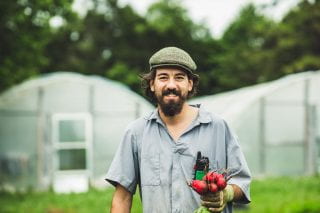
According to the U.S. Department of Agriculture, an estimated 70 percent of U.S. farmland will change hands in the next 20 years. Family operations that do not have a next-generation skilled in or willing to continue farming will likely go out of business. If not, they will be absorbed into ever-larger farming operations or be converted to non-agricultural uses.
It’s easy to see the potential societal problems in this scenario with ever-growing populations that must be fed. Empty grocery shelves during the pandemic were an unsettling reminder of lost local farms and our dependence on supply chains to bring food in.
On the positive side, the popularity of local produce is on the rise. This welcome trend creates significant new opportunities for small and beginning farmers and ranchers to become financially secure. This rise offers an alternative to standard industrial farming models, making farming an accessible profession again. Many people, restaurants, grocers, and institutions are committed to buying from local farms these days. After decades of decline, the number of small family farms is finally starting to grow. The concept of “local food systems” is returning to the American conscience. This provides positive opportunities for rural America as well.
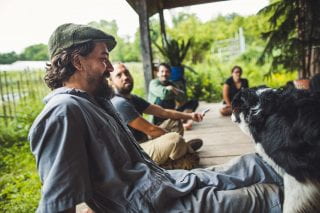 Once Adam determined he wanted to farm this way, he needed instruction and hands-on experience. This is where programs like The Farm School and the Apprenticeship Program at CAFF come in to train and mentor a new generation of small-scale farmers in Arkansas. Adam is now in his second year of the CAFF Apprenticeship Program. He’s been working and learning at Dripping Springs Garden. Through this experience, he’s discovered that he really loves growing flowers as well as vegetables. “They give people a lot of joy. Seeing that, growing them, experiencing their beauty, it has drawn me to flowers as a future possibility as well,” he says. “I’m still determining what type of operation I’d like for my own farm someday.” Feeding people is something Adam will always feel strongly about. He likes the idea of possibly setting up a fresh food bank with his farm. He looks forward to feeding his future family.
Once Adam determined he wanted to farm this way, he needed instruction and hands-on experience. This is where programs like The Farm School and the Apprenticeship Program at CAFF come in to train and mentor a new generation of small-scale farmers in Arkansas. Adam is now in his second year of the CAFF Apprenticeship Program. He’s been working and learning at Dripping Springs Garden. Through this experience, he’s discovered that he really loves growing flowers as well as vegetables. “They give people a lot of joy. Seeing that, growing them, experiencing their beauty, it has drawn me to flowers as a future possibility as well,” he says. “I’m still determining what type of operation I’d like for my own farm someday.” Feeding people is something Adam will always feel strongly about. He likes the idea of possibly setting up a fresh food bank with his farm. He looks forward to feeding his future family.
One thing he is sure about is that he plans to grow as sustainably as possible. He’d like for his future farm to be chemical-free. He feels strongly about investing in the planet’s future and soil through minimal inputs, cover crops, and composting.
For now, Adam is focused on learning all he can about farming, saying he just loves everything about it. He enjoys being outdoors all day and finds the physical labor to be therapeutic. “Feeling frustrated?” he says, “Go rip up some weeds!” He finds joy in all of it and calls shoveling compost “fun.” Farming makes Adam feel grounded. He says it leaves him happy and satisfied to know that he is doing something good for the earth and people.
Adam has advice for others who are considering this type of farming. Most importantly, get experience. He says those thinking about a farm career need to be sure they are cut out for it. They need to determine if they enjoy that type of manual labor. He suggests volunteering on farms as much as possible. Adam also thinks it’s important to visit as many farms as possible and keep an open mind. This is something he’s been doing himself. Adam has traveled to several farms so far in several states. He believes you can learn a lot from just talking to farmers. “Farmers are very willing to share their mistakes with you. Every conversation is an opportunity to learn what to do and what mistakes you can avoid. You learn that there are many ways to grow a tomato, and all of them are viable methods. What works best in Arkansas might not work so well in Kansas. It’s good to see the different methods at all types of farms and learn what you can try.” He recommends the CAFF Apprentice Program as a way to gain experience, saying he’s learned a great deal in his apprenticeship.
Back to our classic American farm story: The young man embarks on a farm apprenticeship through the Center for Arkansas Farms and Food. He learns more about growing vegetables and finds he also loves growing flowers. Somewhere there is a small plot of Arkansas soil that will benefit from all he’s learned. There are people out there that will one day be nourished by the vegetables Adam grows or smile at the flowers he hands them. This farmer’s story is just beginning.
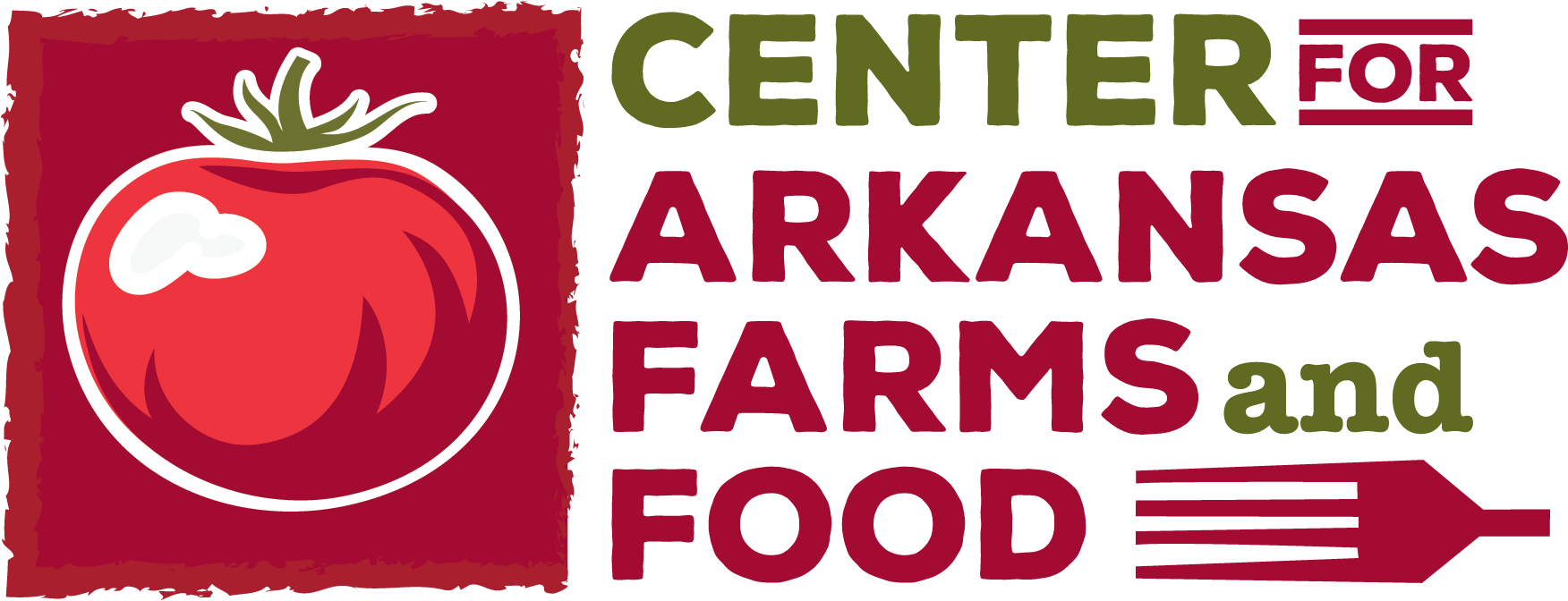
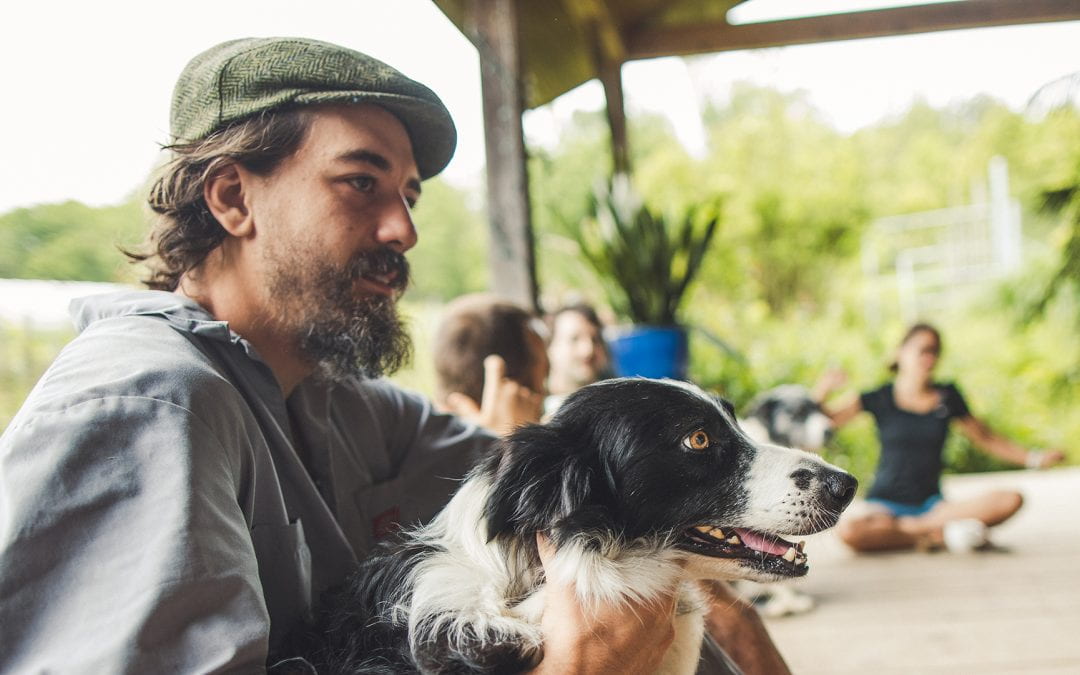
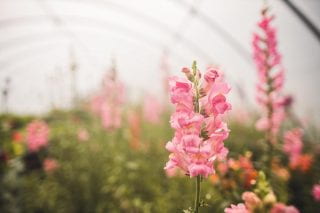
Recent Comments